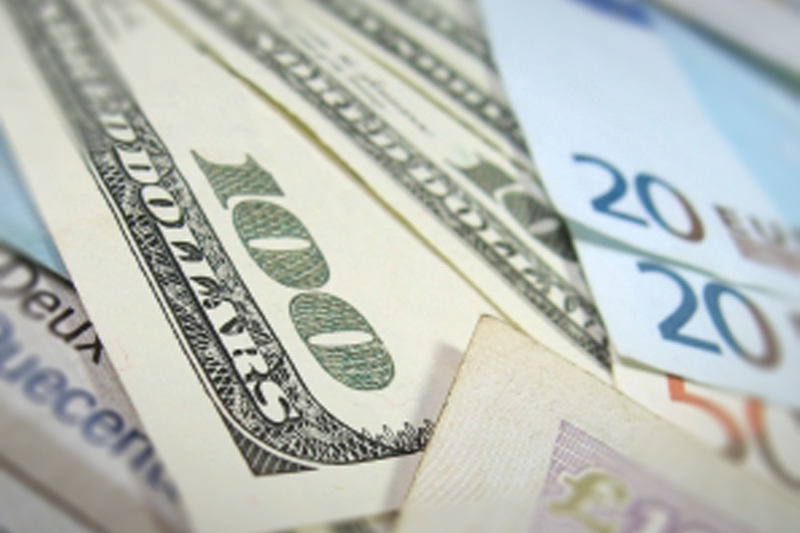Investing.com -- EUR/USD fell sharply by more than 1.1%, hours after Greece agreed to terms with its euro zone creditors on a preliminary bailout package in the wee hours of Monday morning, following all-night, marathon discussions in Brussels.
The currency pair traded in a broad range between 1.0996 and 1.1197, before settling at 1.0999, marking the first time it closed under 1.10 over the last week. As investors worldwide have been on edge throughout this month in anticipation of a comprehensive deal, the euro has closed lower against the dollar in five of the last eight sessions.
EUR/USD likely gained support at 1.0917, the low from July 7 and was met with resistance at 1.1214, the high from July 10.
Greece prime minister Alexis Tsipras returned to Athens on Monday after securing a possible bailout from international creditors during a grueling, often rancorous 17-hour emergency summit. Under Monday's deal, Greece agreed to a wide range of concessions on austerity measures that could pave the way for a three-year, €86 billion bailout through the European Stability Mechanism (ESM). The Greek parliament now has until Wednesday to pass four sweeping laws regarding sales tax increases, pension system overhauls and labor market reforms.
The ratification could trigger a vote by six other EU parliaments later this week. By July 22, the Greek parliament must pass two additional laws in order for talks to proceed. Greece must also open some of its businesses for Sunday trade and privatize its publicly-owned electricity transmission network operator, also known as ADMIE.
"The Greeks have to move first, show that they're credible, that they mean it and at the end of the week we will take the form of a decision moving forward on the program," said Netherlands finance minister Jeroen Dijsselbloem, head of the euro group of finance ministers.
The austerity measures are considered stricter than the ones laid out in a proposal by euro zone leaders late last month, before they were rejected by Greece in a historic referendum on July 5.
In Athens, Greek banks remained closed on Monday as the European Central Bank declined to raise the cap on emergency liquidity assistance to the institutions, which could have allowed them to reopen after two weeks of closures. While European Council president Donald Tusk said that the euro group would work on an arrangement that could provide Greece with bridge financing to meet its short-term obligations, there were no indications of an imminent deal on Monday evening. The majority of the 28 nations in the EU are expected to contribute to the bridging loans, which could provide Greece with €10 to 12 billion to help its banks avoid a shutdown.
Greece owes a €3.5 billion loan repayment to the European Central Bank on July 20.
Tsipras may have won some concessions from creditors by insisting that a divisive €50 billion privatization fund remain in Athens. The proposed "external and independent fund," created through a sell-off of Greek state-owned assets would be used to recapitalize banks, reduce Greek debt and pay for other investments. Tsipras' negotiating partners originally intended for the fund to be established in Luxembourg.
Without a comprehensive deal, Greece faced the prospect of a default on its sovereign debt and a possible departure from the euro.
"We faced tough decisions, tough dilemmas. The agreement calls for tough measures," Tsipras said in a statement. "However, we prevented the transfer of public property abroad, we prevented the financial asphyxiation and the collapse of the financial system—this was planned to the last detail – having recently been designed to perfection, and in the process of being implemented."
Yields on government debt throughout the euro zone moved lower on Monday, as fears of contagion from a possible Greek exit receded. Yields on Portugal 10-Year bonds fell nine basis points to 2.73%, while yields on Italian and Spanish 10-Year each dipped by two basis points to 2.11 and 2.09% respectively.
In the U.S. investors await the start of Federal Reserve chair Janet Yellen's two-day testimony before Congress on Wednesday for further signals on the timing of a highly-anticipated interest rate hike. On Friday, Yellen indicated that the Fed could raise interest rates later this year if the U.S. economy and labor markets continue to show improvement in the coming weeks.
The U.S. Dollar Index, which measures the strength of the greenback versus a basket of six other major currencies, gained 0.89% to 96.98.
